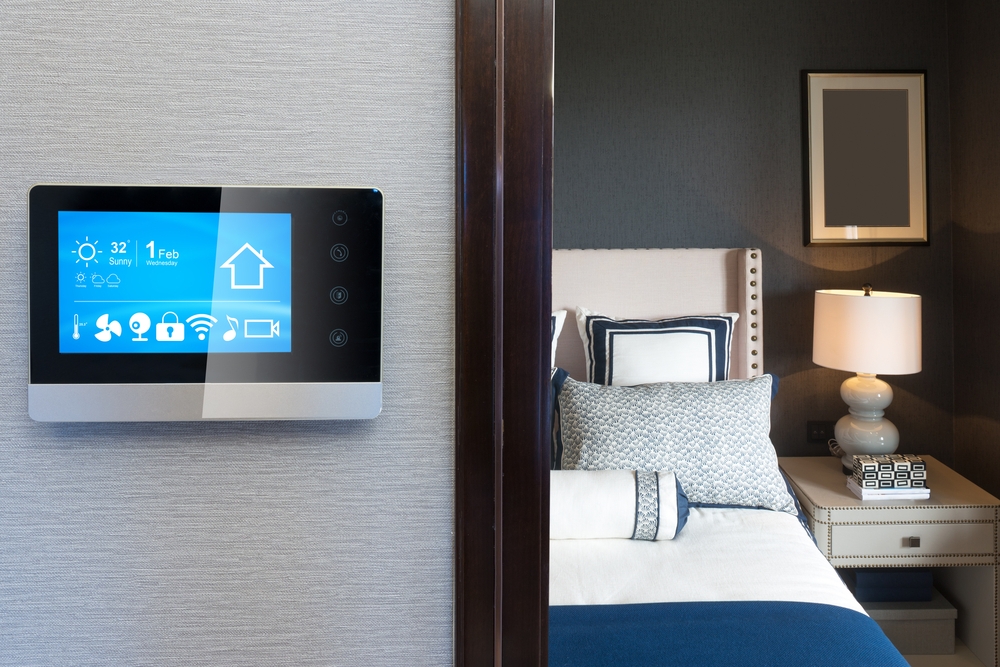Top 5 Hospitality Tips for Hotels to Elevate Guest Experience
By Nikita Nielsen · 19. April 2024
What separates a good hotel from a great one is often the quality of service🔝 provided.
This blog post offers tips for hotels on how they can improve guest experiences through excellent service.
Ultimately, it’s all about creating a welcoming, guest-centred environment that makes for an unforgettable stay.
Key Takeaways
- Start each guest’s stay with a personal touch and full attention to set the tone for a pleasant visit
- Customer service is about more than having friendly employees; it’s a culture. Training, encouraging, and rewarding employees creates a cycle of satisfied guests and loyal staff
- Elevate the guest experience with technology and streamline operations while you’re at it
Creating a Welcoming Environment from the Get-Go
 hotel receptionist giving guest key card
hotel receptionist giving guest key card
Imagine this: You finally reach your hotel after a long journey. As the doors swoosh open, you’re greeted with a warm smile by hotel staff, making you instantly feel valued and at ease.
This is what hospitality in hotels is all about, creating an inviting atmosphere from the moment a guest walks in.
Scripts for front desk staff, personalised welcomes, and maintaining eye contact are just a few of the ways hotels ensure consistency in their hospitality experience.
When guests arrive, they should always be the centre of attention.
A strong first impression can significantly influence a guest’s overall experience in the hospitality world. Creating a warm and welcoming atmosphere sets the stage for a memorable stay.
A Culture of Excellent Customer Service
Outstanding customer service in hotels starts with building a culture that centres around the guest.
But it’s not just about exceptional service; it’s about creating a positive impact that encourages customer loyalty.
Employees who receive thorough training not only understand the hotel’s offerings but can also spot opportunities to enhance the guest experience through upselling.
In hotels, staff is expected to be attentive, friendly, and receptive to guests’ needs. This creates an environment that positively affects both employees and customers, ultimately elevating the overall hospitality experience.
Empowerment of Staff Members
How can hotels empower their staff to deliver exceptional customer service? It begins with creating a supportive🤝 and motivating environment, ensuring that all team members are in sync with the company’s strategies and objectives.
Staff should identify with the hotel’s vision and values, which inspires a sense of responsibility and pride in their roles.
A work culture that values autonomy and praise can increase job satisfaction and a sense of achievement.
It’s about equipping staff with the necessary skills, knowledge, and tools they need while encouraging their creativity and initiative.
Consistent Training Programs
Regular and consistent training ensures that all employees, old and new, have the necessary skills and knowledge to provide excellent customer service. But the benefits don’t stop there.
Ongoing training can also boost engagement and employee retention, contributing to the hotel’s long-term success🏆.
Celebrating Positive Feedback
Acknowledging staff efforts and achievements is key to encouraging the behaviour that leads to excellent customer service.
Incentives such as bonuses and promotions are effective ways to reward staff for receiving positive feedback from guests.
Keep in mind, aligning incentives with staff members’ values and preferences is vital. This truly celebrates their accomplishments and promotes a culture of good customer service.
Personalising the Guest Experience
 Person Checking Order From Hotel Room Service
Person Checking Order From Hotel Room Service
Personalization is the key ingredient for creating a unique and memorable guest experience.
When hotels make guests feel special, they are more likely to remember their stay and return in the future.
Modern technology plays a big role in customising the guest experience. CRM software, for example, helps hotels in understanding guest behaviours and preferences.
In-room smart controls and high-definition entertainment systems allow for individual customisation, showcasing the hotel’s commitment to a tailored experience.
Automation software is also essential. It enables the sending of personalised messages and offers, enhancing loyalty programs and boosting guest engagement. Special promotions can also ensure repeat business.
Leveraging Technology for Efficiency and Engagement
 smart screen hotel modern bedroom
smart screen hotel modern bedroom
In today’s digital world, technology has become a game-changer for the hospitality industry.
Hotels are adopting smart, cloud-based technology and property management systems to:
- Automate tasks such as room cleaning and service coordination
- Streamline overall operations
- Significantly cut down on wait times through mobile check-in and check-out solutions.
Apps and in-room tablets are another tool that hotels use to boost efficiency and engagement.
These tools allow guests to control room settings, request services, and access information about the hotel and local area, blending convenience with personalisation.
Enhancing Communication with Guests
 two hotel receptionists attending to guest
two hotel receptionists attending to guest
Effective communication is key to the success of the hospitality industry and can greatly impact customer satisfaction and the overall guest experience.
Clear, friendly, and professional interactions can make a huge difference in a guest’s experience, meeting and even surpassing customer expectations.
Technology again comes to the rescue with tools like chatbots and voice assistants. These can facilitate communication before, during, and after the guest’s stay.
For example, they can act as virtual assistants for check-ins and respond to queries.
During the guest’s stay, push notifications can be used to deliver real-time information and updates, making guests feel appreciated and well-informed.
Streamlining Operations
Compliance with standards like PSD2 and PCI-DSS are essential. It guarantees safe and smooth payment processes, streamlines operations and allows staff to focus on customer service.
Ensuring PCI compliance is particularly important as it allows hotels to:
- Comply with regulations
- Streamline operations
- Reduce time-consuming administrative tasks
This, in turn, can lead to increased revenue.
Responding to and Learning from Customer Feedback
 hotel experience feedback by a customer
hotel experience feedback by a customer
In the hospitality industry, paying attention to customer feedback is crucial. It helps hotels understand and meet customer needs and expectations.
Responding to negative reviews quickly and genuinely can turn a negative experience into a positive future expectation for guests. Personalising responses shows genuine care and attention to individual guest needs.
Making actual changes following negative feedback shows a commitment to service improvement.
Continuous validation and training of staff ensures that customer service evolves and improves in response to the received feedback.
Staying Ahead of the Curve with Industry Insights
To stay competitive in the hospitality industry, hotels need to consistently innovate and update their services.
This could mean offering seasonal menus, promotional offers, and limited-time packages that highlight local holidays or events.
Networking is essential for staying informed about the latest trends, technologies and best practices.
Attending events and conferences, joining professional hospitality associations, and engaging with peers on online forums can all effectively help hotels stay ahead of the curve and ensure top-notch service to guests.
Regular Market Research
Frequent market research is essential for hotels to:
- Understand changes in industry trends
- Stay competitive
- Analyse and customer behaviour
- Adapt their services to meet changing customer needs and expectations.
This research can help hotels identify gaps in their services, understand customer preferences, and anticipate future trends. This knowledge is invaluable for tailoring services and staying ahead of the competition.
Networking and Continuous Learning
In the hospitality industry, it’s crucial to engage in networking and pursue continuous learning to stay updated on industry updates.
Participating in industry events and conferences, joining professional hospitality associations, and engaging with peers through online forums can provide valuable insights.
Continuous professional development is also crucial. Hospitality professionals can boost their expertise and stay current with industry trends by enrolling in relevant courses, attending webinars, and engaging in thorough industry research.
Summary
In summary, enhancing the guest experience in the hospitality industry involves multiple key components.
It requires creating a welcoming atmosphere, establishing a culture of outstanding customer service, personalising the guest experience, using technology effectively, and learning from customer feedback. Staying on top of industry trends is also essential.
And let’s not forget that at the heart of any exceptional hospitality experience is a straightforward but simple principle: making guests feel valued and special.
Frequently Asked Questions
What is the role of technology in enhancing guest experience?
Technology is key in creating an exceptional guest experience, from understanding preferences with CRM software to providing personalised service through in-room tablets. It’s all about making the stay unforgettable.
How can hotels respond effectively to negative feedback?
Hotels should respond to negative feedback quickly and sincerely, personalising their response to show genuine care and address guest concerns. A genuine response can turn a negative experience into a positive one.
Why is regular market research important in the hospitality industry?
Regular market research is crucial in the hospitality industry because it allows hotels to keep up with industry trends and stay ahead of the competition.
How can networking and continuous learning benefit hospitality professionals?
Networking and continuous learning are essential for hospitality professionals to stay updated on industry trends and deliver exceptional service to guests.
What is the importance of creating a welcoming environment in hotels?
Creating a welcoming environment in hotels is crucial as it instantly puts guests at ease and contributes to a feeling of being valued. It shapes the overall hospitality experience in a positive way.

